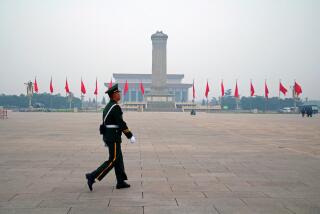China accuses dissident artist Ai Weiwei of ‘economic crimes’
- Share via
Reporting from Beijing — Chinese authorities accused Ai Weiwei, one of the nation’s most celebrated artists and dissidents, of “economic crimes” Thursday as criticism poured in from the United States and elsewhere about Beijing’s crackdown on dissent.
The 53-year-old Ai, designer of the “Bird’s Nest” stadium built for the 2008 Summer Olympics, was seized by border police Sunday at the Beijing airport as he prepared to board a flight to Hong Kong. He is the most renowned of the dozens of writers, intellectuals, bloggers and activists who have been swept up by authorities since mid-February.
In the first public comment on Ai’s case, foreign ministry spokesman Hong Lei told reporters at a regular press briefing “it has nothing to do with human rights or freedom of expression.”
On Wednesday night, Jon Huntsman, the U.S. ambassador to China, in a rare public venting of criticism against the host country, chided Beijing for its treatment of Ai and others who “challenge the Chinese government to serve the public in all cases and at all times.”
“The United States will never stop supporting human rights because we believe in the fundamental struggle for human dignity and justice wherever it may occur,” said Huntsman, a former Utah governor who is leaving his post this month to explore whether to seek the Republican presidential nomination.
China had maintained absolute silence about why Ai was seized until the wee hours of the morning Thursday, when a one-sentence dispatch on the English website of the official said police were investigating Ai Weiwei “for suspected economic crimes in accordance with the law.”
The article did not appear on the Chinese site, and it was deleted AFTER ABOUT ONE HOUR.
Earlier in the day, another English-language publication with links to the Communist Party, the Global Times, denounced Ai as a “maverick” who likes to do things that “others dare not do.” The editorial also said that Ai had made an April 1 trip to Taiwan via Hong Kong and that the “departure procedures were incomplete.”
The clumsy handling of the case suggests that authorities are struggling to come up with plausible charges to level against Ai.
“We actually don’t know what they’re taking about,” said Jennifer Ng, an assistant who had been traveling with the artist on Sunday when he was seized.
In a telephone interview from Hong Kong, she said that Ai was in Beijing on Friday, a fact that is well-known to authorities who had him under nearly constant surveillance.
Ng said that Ai had been planning a trip to Taiwan to discuss an art exhibit, and he had all the necessary paperwork. “We have gotten no formal explanation about what happened,” said Ng.
At the Beijing airport, she said, she asked a customs officer where Ai had been taken and was told that “he has other business to attend to, so he cannot board the flight with you.”
Besides the United States, Germany and the rest of the European Union have protested Ai’s detention.
In an unusually assertive step, China’s ambassador to Germany was summoned by Foreign Minister Guido Westerwelle in Berlin, who later said in a news conference that “the artist Ai Weiwei must be released.... We clearly back freedom of artistic expression and free speech.”
Ai’s case recalls last year’s conflicts between China and the international community over the award of the Nobel Peace Prize to imprisoned dissident Liu Xiaobo.
barbara.demick@latimes.com
More to Read
Sign up for Essential California
The most important California stories and recommendations in your inbox every morning.
You may occasionally receive promotional content from the Los Angeles Times.












